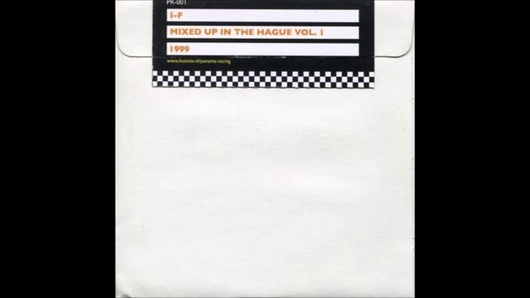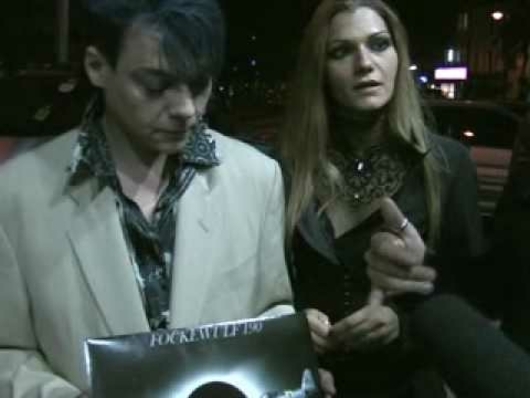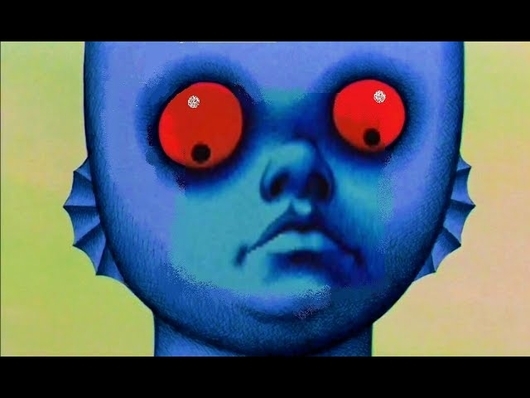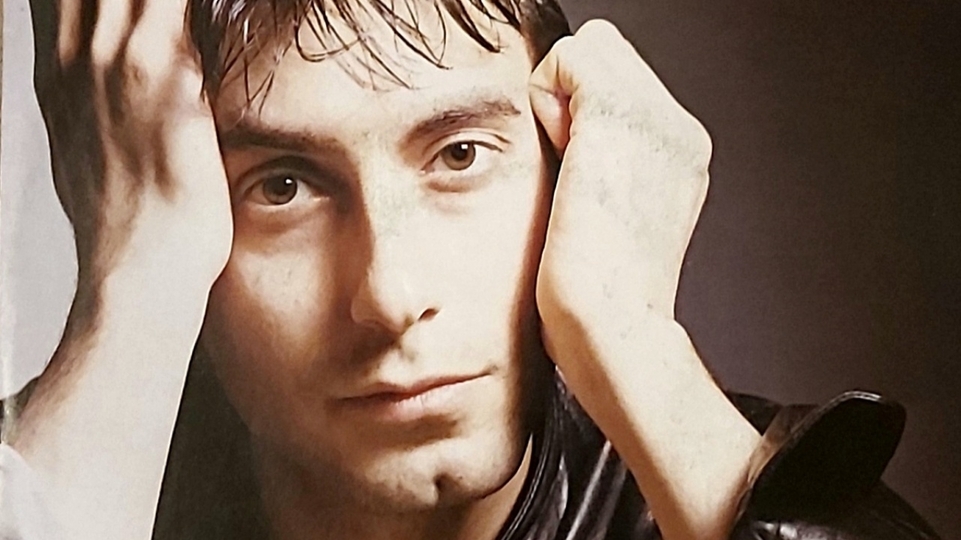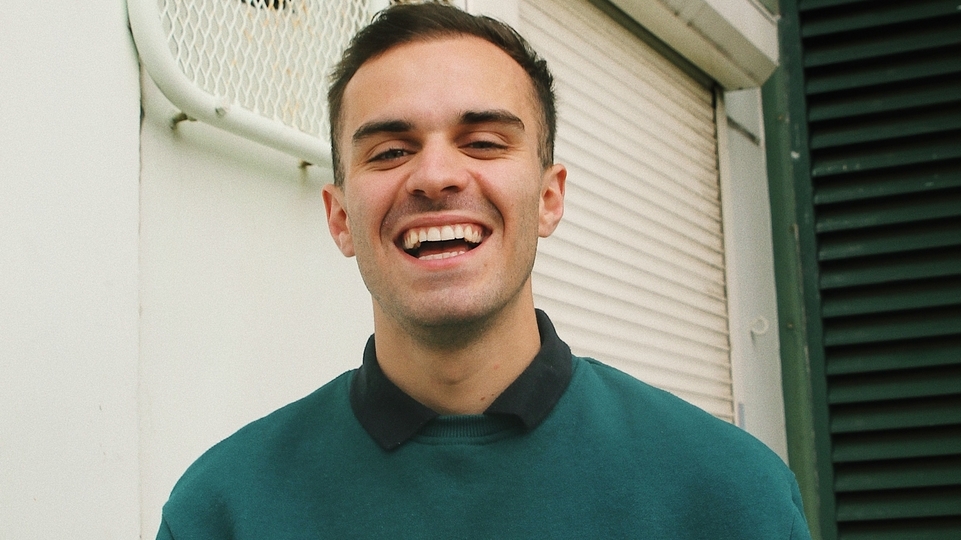
Italo disco’s eternal evolution
Italo disco is everywhere again. But what does Italo even mean today, and is it at risk of being diluted into a catch-all term for anything with an '80s disco sparkle? Joe Roberts dives into the genre's history, and chats to some of its new devotees and longstanding champions about its ever-evolving sound
It now sounds like a DJ mix of the most widely-known Italo disco classics, but when it was released in 1999, I-F’s ‘Mixed Up In The Hague Vol. 1’ was a revelation. A window into a sound born in Italy in the late ’70s and ’80s, and obsessed over by the pirate radio stations of I-F’s home city in the south of The Netherlands, for many it was a world they’d never experienced before. Futuristic yet retro, poppy but built for dancefloors, the mix was packed with now canonic tracks like Charlie’s ‘Spacer Woman’, Mr. Flagio’s ‘Take A Chance’, Alexander Robotnick’s ‘Problèmes D’Amour’ and Klein & M.B.O’s ‘Dirty Talk’, all evergreen anthems that continue to enchant successive new generations.
Since then, documentaries such as 2018’s Italo Disco Legacy and last year’s Italo Disco: The Sparkling Sound Of The 80s have taken a look at the roots of Italo. Born out of the optimism of a new decade, young producers enamoured with the exciting potential of electronic synthesisers, and Italy’s thriving club scene, it created European stars out of acts such as Koto and Den Harrow (the latter of whom is the subject of another documentary, 2019’s Dons Of Disco). As it ran wild, the sound ventured in all directions, from outre cheese to icy gothic cool, from melancholic and bittersweet to ecstatic and celebratory. In the UK, meanwhile, it largely passed unnoticed, bar a handful of commercial chart hits.
Embraced by Germany, the ZYX label coined the term ‘Italo Disco’, needing a banner to market this wide-reaching sound. Even during its ’80s peak though, it proved divisive. Inspired by influences including the late Greek composer Vangelis, the arpeggiated electronic disco of Giorgio Moroder, funk, new wave, French space disco and UK synthpop, Italo could be a strange amalgam, often topped by nonsensical lyrics sung in English. As Italian cosmic disco pioneer Daniele Baldelli readily admits in Italo Disco Legacy, while the style was happening in his home country, he was more interested in collecting records from France, England and Germany.
This idiosyncratic nature, often aiming to be one thing but inadvertently creating something new, is part of the undeniable charm of Italo’s legacy, as well as its pure passion and poppy experimentation. Embracing new technology, including Roland’s 808 and 303, when it reached America it chimed with Chicago’s early house scene, with the Godfather of House Frankie Knuckles remixing Jago’s 1983 hit ‘I’m Going To Go’, a favourite of Paradise Garage resident Larry Levan’s.
23 years after I-F inspired a new wave to search for the sound’s holy grails, Italo is a buzzword once again. It has infiltrated the sets of headline house DJs; reissues of sought after tracks, whose original pressings sell for hundreds of pounds, fill the racks of shops such as Rotterdam’s Clone Records and Amsterdam’s Bordello A Parigi. From Middlesbrough to Toulouse, Helsinki to Korba, a new generation is making music that’s a love letter to the Italo of old. This year, Cybernetic Broadcasting System, the online radio show I-F set up as a successor to The Hague’s pirate stations of old, turned 20. In May, Intergalactic FM, the station it now broadcasts from, held a three-day festival in the Hague. Italo, it seems, is everywhere.
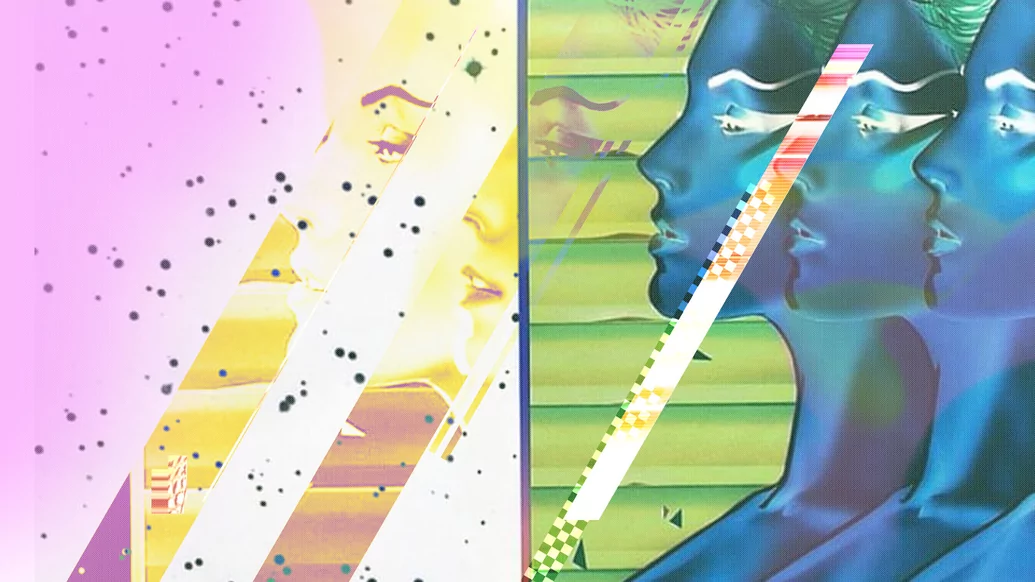
“This must be the eighth or ninth revival,” smiles Ali Renault when he speaks to us from his Margate home studio. “It’s kind of a mainstay now.” One of those turned onto Italo by ‘Mixed Up In The Hague’, Renault had previously been making electro. But after the bug took him on digging trips to Europe, in 2005 he launched Cyber Dance Records alongside co-founder James Penrose, aka Casionova, pushing the UK’s first wave of Italo-influenced music. The duo’s debut split-release sports the Cyber Dance logo over a union jack painted in the colours of the Italian Il Tricolore, both nationalities celebrated together. “We quickly found out there was no support in the UK,” he says, and they had to instead distribute and sell their records in Europe.
Despite living in Italy, Marcello Giordani (also known as one-half of the duo Marvin & Guy) only began rediscovering the music he’d heard on the radio in his youth after Brooklyn duo Metro Area did a DJ mix in 2000 for an Italian radio programme called Weekendance. Armed with a Walkman, he took the tape to record fairs to play to dealers. “They used to laugh and say, ‘This is the Italian dance shit from the ’80s’, because for them the only good disco was from the US or UK. Then I came home with a hundred killer Italo records at 50 cents each.”
In 2008, this led to the launch of his blog Italo Deviance, which in 2009 also spawned Italo Deviance Records. Lifting the lid on music that had been played at long-closed Italian nightclubs such as Cosmic, Typhoon, Baia degli Angeli, Chicago and Xenon, the blog quickly attracted an international community — helping seed Italo’s spread.
In the mid-2000s, Renault formed live act Heartbreak with Sebastian Muravchik. They toured for three years, performing with original ’80s stars such as Casco and Fred Ventura. These connections, plus becoming involved with Intergalactic FM, led to him co-promoting 2009’s Magic Wave festival. Held at Corsica Studios, it brought over a host of original Italo performers to the UK for the first time, including Fockewulf 190, who hadn’t performed together for 25 years. Combining Italian originals, Dutch obsessives such as Legowelt and Alden Tyrell, and early English enthusiasts, footage on YouTube shows Fockewulf’s Vittorio Barozzi, who sadly died in 2012, proudly declaring, “British people are in love with Italo music”.
Another UK DJ who fell in love with Italo in the mid-noughties, Serge Santiago, made a slew of Italo disco edits, which he released on a vinyl colour series before his Italo cut ‘Atto D’Amore’ — released on his own Acrobaleno label (meaning ‘rainbow’ in Italian) — became big in the east London scene, as did his squelchy ‘It’s A War’ release with Tom Neville under the name Retro/Grade, a cover of Italo band Kano. Their strange, experimental ‘Moda’ then went on to find favour with the likes of Simian Mobile Disco, Erol Alkan and Boys Noize.
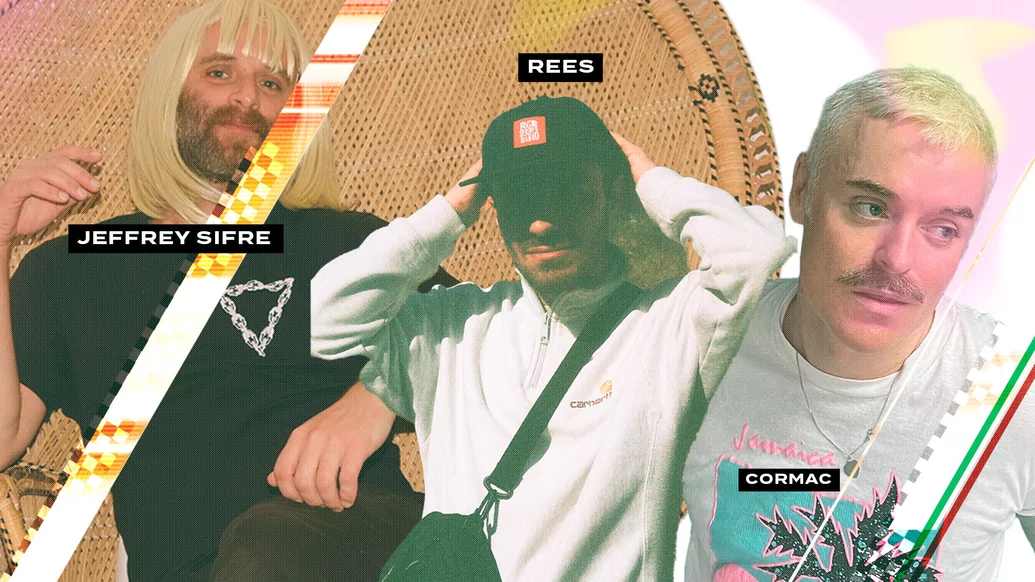
“Synthesised beats, dreamy lyrics about love, outer space, desire and loss. I think that great Italo disco has romanticism and some melancholy” - Cormac
During the 2000s, electroclash’s DIY punkiness and camp exuberance found a bedfellow in the eccentricities of ’80s Italy. Berlin-based, Northern Irish DJ Cormac recalls first hearing Italo on the radio, via chart hits such as Sabrina’s ‘Boys Boys Boys’, Spagna’s ‘Call Me’ and Laura Branigan’s ‘Self Control’, a cover of prolific Italian vocalist Raf’s debut (check the original for a dose of Italo rap).
“As a queer kid, it was a perfect storm musically,” he tells us over email while touring. “Synthesised beats, dreamy lyrics about love, outer space, desire and loss. I think that great Italo disco has romanticism and some melancholy.” Working the door at Nag Nag Nag, the infamous central London club which ran from 2002-2008, he recalls hearing Charlie and Mr Flagio. But contemporaneous tracks, such as Tiga & Mateo Murphy’s ‘Fools Gold’ and Miss Kittin & The Hacker’s ‘The Beach’ — which samples Gary Low’s ‘I Want You’ — were fresh inspirations, he says.
Forthcoming on Cormac’s Polari label is an EP from UK producer Emmet Read, “who has a fantastic Italo ear”. Modern Italo’s greatest legacy though, he says, is Sfire’s ‘Sfire2’, the 2016 track that arose from a pairing of the greatly mourned SOPHIE and Detroit-based Jeffrey Sifre, which Cormac included on his 2021 Essential Mix. “For me it’s really a hit forever.”
Capturing the soaring, spine-tingling emotion and melodic razor-sharpness of Italo’s smartest pop moments, while stepping away from the pastiche that characterised some of its earlier imitators, the Sfire project was inspired by the pair bonding over Pineapples’ ‘Come On Closer’ and IMS’ ‘Dancing Therapy’, as well as perennial SOPHIE favourites The Pet Shop Boys and Autechre, Sifre says.
Sifre’s own journey also began with I-F, having been into Dutch electro in the late ’90s. But it was after moving to Chicago for college that he discovered “the WBMX radio legacy and the Hot Mix 5 DJs and realised I was in the most Italo city in America”, with many of the records they’d played still languishing in record shop bargain bins. At the time, he notes, the rave scene was very straight and serious. In contrast, Italo ”was unique and fun and bright”.
Since, he’s embarked on a musical journey that’s taken in freestyle, which he says was birthed by Italo’s huge popularity in Mexico, and early NYC house, often made by former freestyle producers. There are plans to get back to “singing and making music with inspiring friends”, having last put out the dark, synthy ‘Flamingo Boots’ EP on Dark Entries in 2017 as one half of Looky Looky, alongside Ian Clark. For now, though, it’s label-mate Bézier. part of Honey Soundsystem, whose dark take on Italo he points to as running with its legacy: “I like when you can hear an influence but there is a new twist on the sound.”
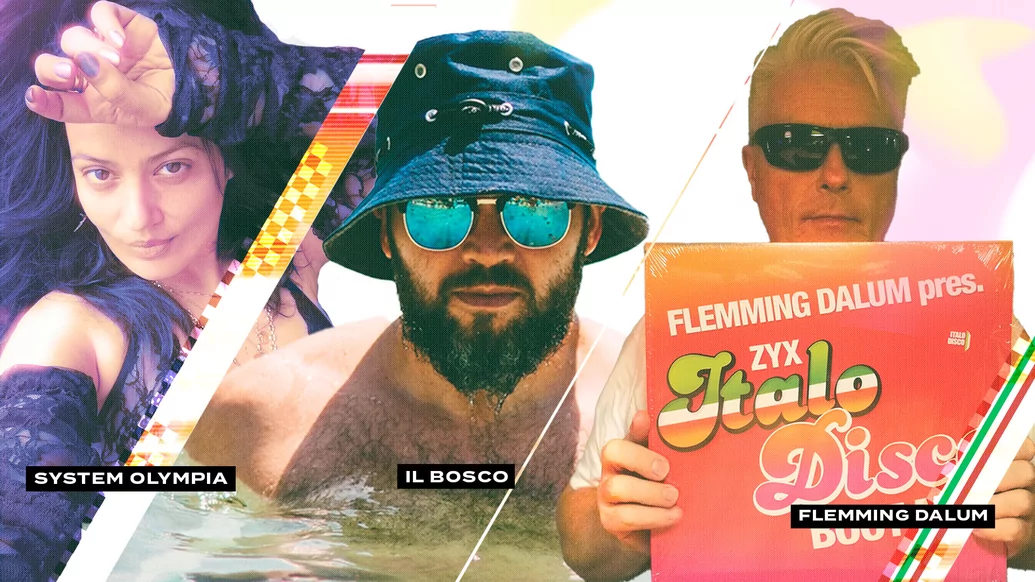
It’s a sentiment agreed with by Il Bosco, aka Christian Wood, or just Woody, head of Manchester’s ‘Manctalo’ label Red Laser. Founded in 2012, Red Laser has shone a light on local Italo-inspired artists including Kid Machine, Starion and Ste Spandex. “I think that as an artist in music these days, the best you can hope for is to have your own style,” he says of how every style and tempo has been explored — all you can do is put your personal stamp on it.
Red Laser brings with it a knowing sense of humour, while still being dedicated to its sound. Senor Chugger & Count van Delicious’s ‘Dark Fruit’ is a case in point, a heady blend of spacey synths, motivational spoken word and what sounds like Gregorian chanting, which found its way onto the USBs of DJs such as Job Jobse and Panorama Bar resident Roy Perez.
“Loads of Italo is shite,” grins Woody bluntly, describing how, in Italy’s ’80s scene, anyone with a synth and a friend who could sing was able to go and press up a small run of records. “But there’s some really good bits, or there’s an instrumental.” Its strength, both in the past and now as a source of inspiration, he continues, is that, like the ’80s rare groove scene, it encompasses multiple genres: “Pop, EBM, boogie, synthpop, rap, mad new wave.”
Part of Manc hip-hop party Friends & Family in the late ’90s/early 2000s, it was through rediscovering ZYX records in his collection that he’d previously dismissed, as well as hearing I-F, that seeded Woody’s love of Italo. “I got inspired by it very quickly. Part of me thought, ‘we might be some of the first here’. Not in Europe, but in England there seemed to be less knowledge of the scene.” A trip to Italy followed, record shopping by day, eating and drinking red wine by night. “I never bought anything for more than a euro and the tracks I bought on that first trip became the first Red Laser LP, ‘Hits From The Manctalo Diskoteque’.”
Searching for newly listed Italo records as they were added to Discogs, Woody continued this digging into Italo’s past at home, and Red Laser has built its reputation re-releasing old music (on limited vinyl) alongside music inspired by it. With an Italian record dealer who now contacts him whenever he discovers unlisted Italo, his edits continue to bring the past into the present, beefing up the production and chopping out the less palatable elements.
With Il Bosco’s DJ sets at Red Laser’s party at The White Hotel also featuring piano hardcore, the label draws a parallel between the two. Releasing breakbeats under his alter ego DJ Absolutely Shit, a project with another Manchester musician Metrodome, Woody points out that both are built around an unashamed love of cheesy melody, as well as an obsession with future worlds. “Pop sensibility lives in Italo,” he says, adding Italian piano house, which grew out of Italo, was part of rave’s DNA. “When it crosses the line, it’s awful. But when it just about hangs on the line, it’s genius.”
Red Laser grew out of a deep immersion in ’80s Italo, but there’s a newer generation for whom digging back into its rarer obscurities is less important — perhaps because much of it is only available on vinyl and prohibitively expensive, even official reissues quickly selling out and appearing on Discogs at inflated prices.
For 25-year-old Liam Smith, aka The Real Escobar, who runs Midnight People, it was hearing DJs such as Solomon, Dixon and Hunee that first exposed him to “Italo synth lines”. Then a Palms Trax set, which featured an hour of Italo, “piqued my interest, it was such a good, happy, joyous feeling”. Linking together tracks from Baby’s Gang’s ‘My Little Japanese Boy’, a 1985 track fronted by future UK Top 10 vocalist Ivana Spagna, to more modern takes — like Bronco Joyce’s 2018 ‘The Need For Speed’ EP, released by Bordello A Parigi — it helped inspire the creation of Midnight People, both as a label and a party.
Having had guests such as Theo Kottis and Bicep-affiliate Hammer, who last year launched his own label called Italo Hiits, today he’s part of a crew of similarly-minded DJs and producers that includes Tech Support, REES and PADDY. The label’s latest release, meanwhile, comes from PBR Streetgang’s Bonar Bradberry, the disco producer adopting the new moniker of Magari to pursue a synth-ier new direction. “It did the rounds on Radio One,” notes Smith of how the sound’s reach is expanding, played by Danny Howard, Jaguar and Sarah Story before finding its way to Pete Tong.
“Italo tracks usually bring a big hands in the air moment, it’s so centred on the synth line and the highs instead of the low,” he says on the all-round appeal, citing Gerd Janson’s Running Back, and especially associated artists Lauer and Krystal Klear, as having helped popularise it. He name-checks REES’ Paradiso Records and Spain’s Italo Moderni, whose aesthetic adds a dark twist, as also leading the way, alongside artists including Tolouse’s Kendal, the Berlin-based Pablo Bozzi, whose recent Bicep mix blended Italo with Mexican EBM and ’90s German trance, and Perel, another Berlin-based artist whose second album, ‘Jesus Was An Alien’, sports a cover of her breastfeeding an alien with the Earth behind her as a halo — a real life Spacer Woman.
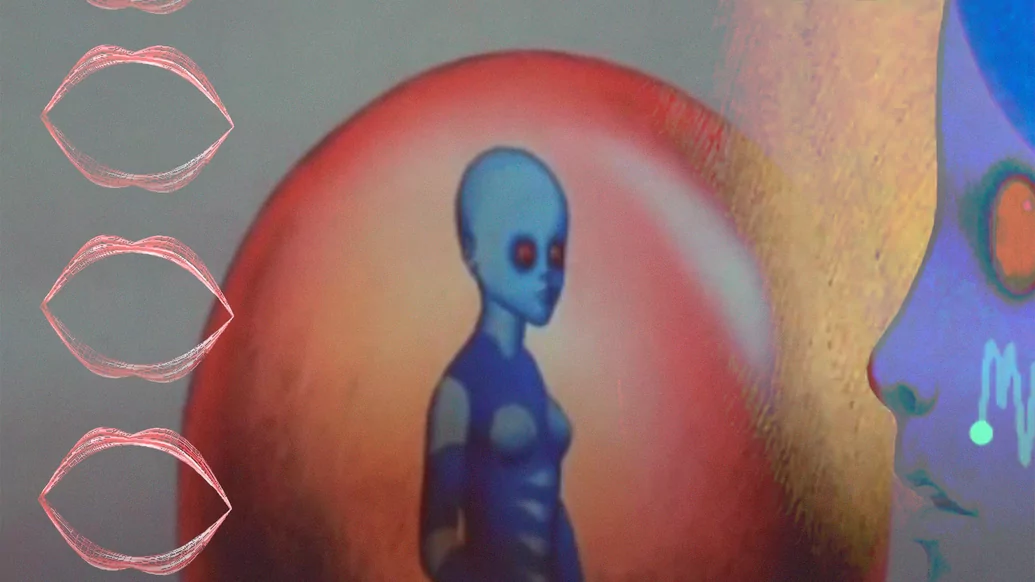
Charlie’s ‘Spacer Woman’ holds an eternally special place in the Italo canon; it’s the track that new converts love, and veterans love to hate. When a Cantonese cover version began appearing in DJ Harvey’s sets at Pikes, and Orpheu The Wizard later closed the Selector’s Stage with it at 2019’s Dekmantel. The internet lit up. Emerging as the work of Hong Kong-based producer Romain FX, it was eventually released as a limited Bandcamp download by Hong Kong’s Fauve Records. An off-shoot of the city’s Fauve radio, the label has also released two comps, featuring modern productions, under the title ‘Make Italo Disco Great Again’ — illustrating just how far Italo’s influence reaches.
This international embrace continues through artists like Tunisia’s Khemir. Bringing MENA (Middle East & North Africa) sounds together with a love of ’80s music in general, his ‘Italo Raï’ edit of Cheb Kada’s ‘Rani Mellite’ for Lyon’s Hard Fist adds a wistful melancholy to the Arabic singer’s 1986 original. Dublin-based Moving Still has been taking a similar approach to music from the SWANA (South-West Asian and North African) region. His bouncy 2020 edit of Egyptian pop star and singer Azah Kamal’s ‘Maadna Bkra’, made with Dutch producer Tjade, topped Amsterdam record store Rush Hour’s sales chart, and was followed up by last year’s free ‘Ouddy Bangers Vol. 1’, an EP of similarly Italo-influenced edits.
“The versatility of the genre is what captivated me the most,” says Middlesborough-based REES, who name-checks various influences as Skatebård, David Vunk, a Dutch Italo fanatic who runs the long-standing Moustache Records, and Hysteric, the Melbourne-based DJ, re-edit master and head of reissue label Mothball. “I wanted more diversity in my production and DJ sets, and Italo allowed me to do this. It can move between many genres and styles; from the uplifting sound of its Hi-NRG and disco roots, through similarities to synthpop and new wave, to the tougher sounds of Chicago, new beat and body music that pay homage to it. You can hear the similarities and innovativeness between these genres spilling over into one another.”
System Olympia, aka Francesca Macri, a DJ, producer, live act and NTS resident, grew up in Italy, but now resides in the UK. For her, Italo’s overt sexuality is an inherent part of its legacy, something she continues to embody. “Italo was just part of normal pop music on the radio,” she tells us, having just performed alongside DJ Harvey at Nuits Sonores. “Sabrina Salerno was one of the main music icons at the time. What I liked about the whole genre was the basslines, the drum machine sounds, some of the synths, and the sexiness of the women that they used to attract listeners,” adding that listeners to her own show tell her they have the best sex to it. A resident at Jazz Cafe’s new Italo Disco Party, playing alongside Alexander Robotnick and Daniele Baldelli, she tells us “they like having me because I have a different take on the genre — feminine and sensual, none of its corny elements, but still hitting hard on the dancefloor”. Her next release ‘Amami Cosi’, she says, is her own contemporary Italo take.
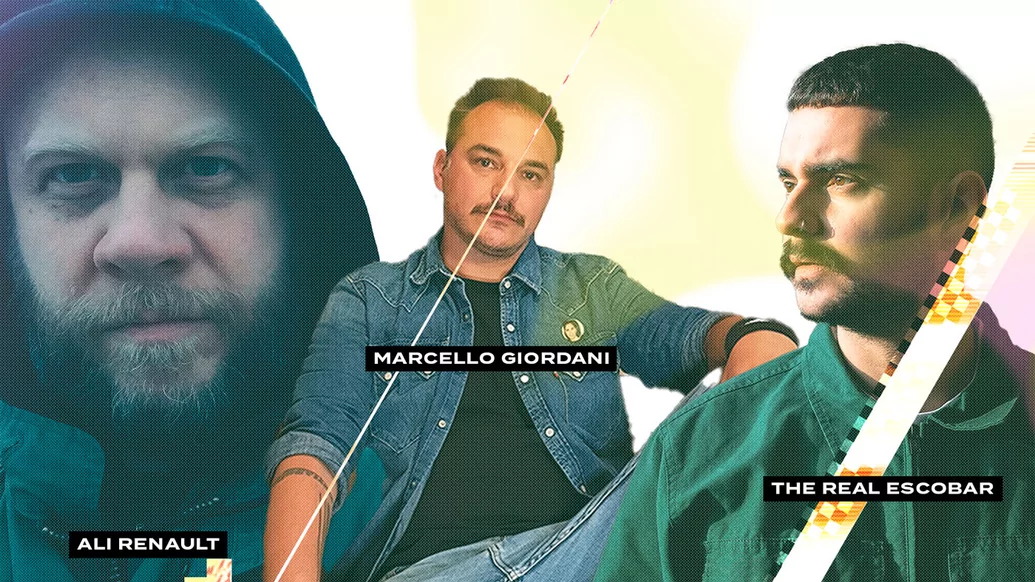
“What is actually considered Italo nowadays?” asks Otto Kraanen, the man behind Bordello A Parigi. Starting the label in 2011, he set up a webshop stocking similarly minded labels — such as Franz Scala and Fabrizio Mammarella’s Slow Motion, and Vercetti Technicolor and Antoni Maiovvi’s Giallo Disco — before evolving into a distributor, a shop and, most recently, Bordello Aperitivo, a small bar. Another of those influenced by the revelatory power of ‘Mixed Up In The Hague Vol. 1’, he still stresses the importance of reissue labels, like Giorgio Records, Disco Segreta and I Venti, as well as newer digger DJs The Baldeejays and Mr. Fantasy. Fred Ventura, who has continued to provide vocals on labels such as Clone, is another ever-pivotal figure, he adds. For Giordani, Italo is also still being carried forward by labels such as Toulouse’s Ritmo Fatale, whose motto is ‘No Past, No Present, No Future’.
What everyone seems to agree on is that Italo’s revival owes a great deal to Flemming Dalum. An original Italo obsessive, who between 1983 and 1986 made 11 trips to distributors in Italy from his native Denmark, he says his Italo collection was already complete by that final trip. Known today as an undisputed Italo edit king, he continues to share obscure cuts with the world via labels such as Centre Neptune.
“Often these records became very rare due to bad distribution or no distribution at all,” he explains of how a track such as Firme D’Autore’s ‘All My Life’ is only owned by two people on Discogs. “Copies sometimes got stuck at small record labels, which in some cases shut down before the official release. Some records were made as a gimmick for a fashion company. Others were made as promotions for a disco and only handed out in the local area. It means a lot of records never came on sale in a record shop.”
Remixing Italo classics for ZYX, who Renault has also recently worked with, and compiling mixes, Dalum says he noticed the Italo revival moving from an interest in older tracks to the production of new Italo-inspired music — mentioning Senor Chugger’s ‘Press The Flesh’ as a “very cool” example of this resurgence. In response, ZYX have begun asking him to turn his remix hand to contemporary tracks, such as Luca Debonaire’s ‘Let Go’. Expertly flipping the Spotify-friendly original into ’80s-sounding authenticity, “It’s great fun being able to convert modern tracks into something with an Italo signature vibe,” he says.
What’s sure in it all is that whether it’s the Patrick Topping-tipped Alex Virgo releasing next on Midnight People, French disco star Cerrone returning with ‘Non Chiamarmi Mai’ — an Italo disco remake of his 1979 hit ‘Call Me Tonight’ — or Giordani releasing a new single featuring Fred Ventura, ahead of his third album ‘Mysterious Calls In The Night’, the story of Italo is far from over.
“I honestly expected it to die off, to become unfashionable and never come back,” admits Renault, reflecting on Italo’s seemingly never-ending renaissance. “I like the fact you keep having these little bursts of new generations discovering it. It just proves it’s a fascinating inspiration to all.”
